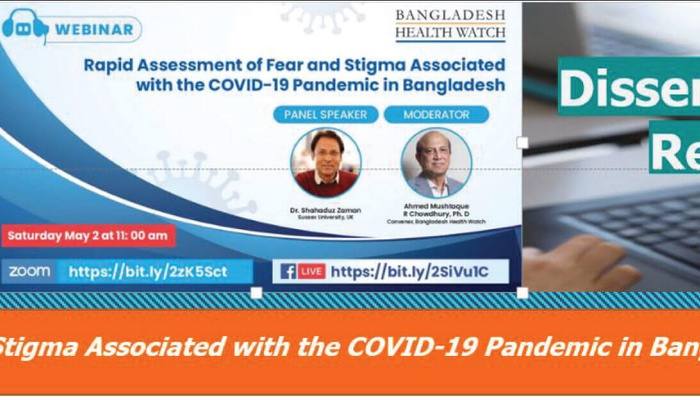

Bangladesh Health Watch, a civil society platform to support Bangladesh's health sector conducted a study on a rapid assessment of fear and stigma associated with the covid-19 pandemic in Bangladesh. The findings of this assessment was shared through webinar on 2 May 2020 which was simultaneously live broadcast in BHW Facebook and the page was viewed by more than one thousand viewers.
(FB link-https://www.facebook.com/109403770656047/videos/3143474829017133/?t=0).
The virtual dissemination program was moderated by the Convener of BHW Dr. Ahmed Mustaque R Chowdhury where public health experts spoke. A total of 85 participants from different sectors i.e. Govt. officials, Public health experts, Physicians, Development activists, civil society members, journalists, development partners, donor representatives joined the webinar and opined that acute fear and stigma were prevailing in Bangladesh over the outbreak of novel coronavirus.
| Category | Total |
|---|---|
| Bangla Newspaper | 5 |
| English | 4 |
| Online | 4 |
| TV | 2 |
| Total | 15 |
The news of this event has also been covered by at least 15 leading print and electronic media.
Data of this study was analysed collecting through telephone interviews, mainstream media, and social media From January to April 20.
Dr. Shahaduz Zaman of Sussex University, UK and Prof Sumon Rahman of University of Liberal Arts in Bangladesh carried out the research and unveiled that the fear and stigma spread among people in six steps.
In the first stage, a false prediction based on religious and scientific ideas spread among Bangladeshi people that the novel coronavirus was a disease of other countries, and it was caused by their sins and food habits. At that time doctors and scientists also sent the wrong message that the novel coronavirus cannot survive in our country's weather.The second phase started at the beginning of March, when the first Covid-19 patient was found here. At that time, people feared those who returned from abroad and stigmatised them, because the first novel coronavirus patient in the country was a person who returned home from Italy. The administration also started marking foreign returnees with seals on their hands, and by hoisting red flags at their homes. People in the community started to humiliate foreign returnees in the third phase. Migrants were prohibited to enter local shops. It worked with the cultural framework of
এক ঘরে কো বা অপবাদ দদওয়া বা কলঙঙ্কিত কো. This thought led them to become more watchful and aggressive about receiving outsiders into the community. During fourth phase, which started in the third week of March, panic spread among local people in an area when a man died from the Covid-19 without coming in touch with anybody who came from abroad. At this stage different types of information on the coronavirus started to appear on social media. Also confusion regarding the burial of Covid-19 patients arose at that time, which caused a "liquid fear" in society.
Media personality Dr Abdun Noor Tushar at the webinar said: “People have now started to understand that some religious preachers have spread misinformation in the name of religion.”
In the fifth stage fear and stigma spread over the confusion about lockdown and shutdown, food crisis, the garments' workers return to Dhaka, increase of patients in different areas in the city, and the lack of PPEs for doctors. During the sixth stage which started on April 2, the very fabric of social order was being destroyed. People began to leave their sick parents out to die in deserted places like forests who had Covid-19 symptoms. They also began to run away from quarantine, and being evicted from their homes by fearful landlords or neighbours, and so on. Sometimes people attacked the houses of novel coronavirus patients and behaved inhumanely with them.
This is how all the structural fear has been derived into cultural fear of liquid nature.
Ahmed Mustaque R Chowdhury suggested campaign against spreading stigma and fearmongering was difficult as they were fighting against the coronavirus spread.
Lenin Choudhury blamed that World Health Organisation was trying to imply foreign formula in Bangladesh that made many misunderstandings and spreading fear and stigma among the people.
Appreciations came from the FaceBook live programme. Question came from facebook to know about the words that should be focused on to propagate message on inverting stigmatization and whether that should be context appropriate i.e. different geographical or cultural location-wise.
Opinion also came from FaceBook that public health personals were not actively involved from the beginning. They should have involved. Political or personal agenda played a role here.
Citizen's Voice